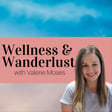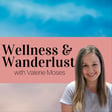
142. Wellness to Wonderful with Dr. Alona Pulde and Dr. Matthew Lederman
What can we do to create a life that truly feels wonderful to us? This week's guests are all about taking our wellness to the next level and making decisions that allow us to thrive both physically and emotionally.
Dr. Alona Pulde and Dr. Matthew Lederman combine conventional Western medicine, Chinese medicine, lifestyle medicine, nonviolent communication and more to create their groundbreaking health paradigm. They have been successful corporate leaders, starred in the life-changing documentary Forks over Knives, lectured for eCornell, served as adjunct medical school professors and corporate medical advisors, and are NY Times bestselling authors.
In their newest book Wellness to Wonderful, Drs. Pulde and Lederman provide practical advice for leading a healthy and vibrant life. In our conversation, we discuss their fundamental pillars of health and how we can live a life that isn’t just “ok” but is truly “wonderful.” We discuss ways to break out of survival mode so that we can really thrive, how to empower ourselves by connecting to our choices, tips for creating purpose, and much more.
If you enjoy this episode, please feel free to rate and review the podcast on whatever app you’re listening on, and share with a friend!
CONNECT WITH OUR GUESTS
Website: https://weheal.health/
Book (Paperback): https://www.amazon.com/dp/B0C2S1JGZK
Kindle: https://www.amazon.com/dp/B0C2JNF8C7
Instagram: https://www.instagram.com/wellness2wonderful/
Facebook: https://www.facebook.com/wellness2wonderful
YouTube: https://www.youtube.com/@wellness2wonderful
Twitter: https://twitter.com/well2wonderful
TikTok: https://www.tiktok.com/@wellness2wonderful
CONNECT WITH THE SHOW
Website: WellnessAndWanderlust.net
Instagram: www.instagram.com/wellnessandwanderlustblog
Facebook: www.facebook.com/wellnessandwanderlustblog
Twitter: www.twitter.com/moses_says

